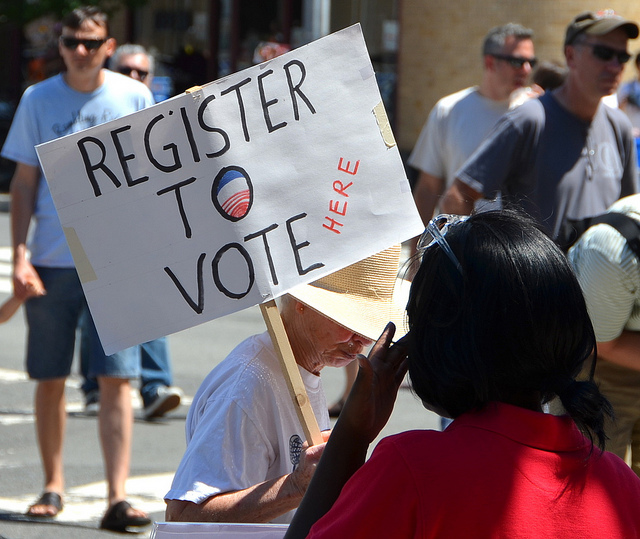Individual electoral registration needs further reform to counteract its negative side effects
Toby James gave the opening talk at the Association of Electoral Administrators conference in Brighton this week. The topic of the talk was ‘From here to where? Modernisation of electoral administration in Britain.’ Here he looks at how the way we run elections can be made improved after May and argues modernisation of the system is necessary, alongside an appreciation of unintended consequences.

Credit: Adam Fagen (CC by NC SA 2.0)
Elections receive widespread coverage in the news and media. Many (normal) people will already be fed up with the media coverage on the UK general election in May, even if politicians, journalists and academics aren’t. But the focus is usually on the outcomes, parties and candidates. It is usually rare that we focus on the mechanics of how the election is run.
This is a major issue in the UK, however, because electoral registration rates are hitting crisis levels. Back in 2012 the Electoral Commission estimated that one in five people are not on the register. This is before the effects of individual electoral registration (IER) are felt, which is widely thought to lead to a decline in registration levels. Yesterday the UK saw a second National Voter Registration Day, organised by Bite the Ballot, to which civil society has been recruited to help drive up registration rates. At UEA students organised a ‘goats for votes’ event. Even Ricky Tomlinson has added his voice to the cause.
With this in mind, I explored whether the registration and voting process could be made more convenient for the citizen. The methods used to run elections in Britain have Victorian origins. The methods for conducting the poll, for example, has its roots in the 1872 Secret Ballot Act. Society has changed and moved on since then.
I explained that research has shown the following to be effective at increasing registration and turnout levels:
- Election day registration
- ‘Motor voter’ registration
- Online voting
- Weekend voting (or holding elections on a holiday)
- (Caution about) Voter ID
- And we could also add all-postal elections
There is therefore a strong case for making these long term policy goals for 2025.
I stress 2025 and not 2020 because all of these goals would involve significant implementation challenges, which were widely discussed at the conference. And we should listen carefully to the electoral community in moving forward. They are uniquely placed to understand such challenges as they are on the front line of democracy.
As many administrators will tell you, the problem with the proposal for election-day registration is that when people currently register to vote online (it is great that they can now do this) the process is not yet finished. Usually unbeknown to the voter, their details will be checked against government databases before their registration can be verified. Electoral administrators need to time oversee this process. Given that May 2015 will be first election under IER, they will need plenty of time to do this.
Likewise, it will take time to build safe and secure online voting systems. Weekend voting is a challenge because electoral officials struggle to find premises.
Setting longer term goals, however, will allow a sense of direction forward. Electoral administrators, academics, the media and civil society should work together to forge an agenda for how elections can be reformed. This is important so that elections are not reformed with only a 5 year plan, set by governments who will have a watchful eye on how they can change the law to make it easier for them to win their next contest.
Planning ahead, we need to think about electoral administration in the round. The side effects of reforms need to be considered. IER, for example, might have reduced opportunities for electoral fraud. However, as I warned in 2011, it may also lead to reduced registrations, involve extra costs, cause election officials to retire early or outreach schemes to end. Elsewhere, I have proposed a framework for assessing electoral management to encourage us to think about this more holistically.
Most analysis of electoral administration usually ends there. But I think that the ‘back office’ of elections are also important. The policies that affect the people who run elections can facilitate better run elections. This is especially important because it that it is becoming harder and harder to run elections. Many electoral officials are having to ‘run faster, to standstill’. We therefore need to:
- Invest money in elections
- Develop schemes to enable local authorities to learn best practice from one another.(also see: here)
- Simplify electoral law
We need a debate after May about how electoral administration can be improved for the long term. In the meantime, it is all hands on deck to encouraging friends, colleagues and family members to register to vote. Or as Jim Royle puts it more directly:
—
Note: This post originally appeared on the Eastminster blog. It represents the views of the author and not those of Democratic Audit UK or the LSE. Please read our comments policy before posting.
—
 Dr. Toby James is a Senior Lecturer in British and Comparative Politics at the University of East Anglia.
Dr. Toby James is a Senior Lecturer in British and Comparative Politics at the University of East Anglia.





 Democratic Audit's core funding is provided by the Joseph Rowntree Charitable Trust. Additional funding is provided by the London School of Economics.
Democratic Audit's core funding is provided by the Joseph Rowntree Charitable Trust. Additional funding is provided by the London School of Economics.
[…] second main strand of this area is the timing of electoral registration. For the forthcoming election, the deadline for registration will be April 20th, 14 working days […]
Some great ideas from @democraticaudit Do you agree that on-the-day voter registration would help get the vote out? https://t.co/QJzWAPijcP
[…] people you would hope would know better, such as political reform experts and academics (on, ahem, a site which boasts in its strapline of “academic […]
[…] to register because they know their votes will not be effective. There is some debate about this on https://www.democraticaudit.com/?p=10914 where another contributor and I have asked why people should register when the chances are their […]
RT @LSEPubAffairs: Individual electoral registration needs further reform to counteract its negative side effects https://t.co/Cay0BgH6Yx ht…
At last a sensible evaluation of indiv voter reg – good but could be better https://t.co/0ZISQqphpz via @democraticaudit #nvrd @BiteTheBallot
Individual voter registration needs further reform to counteract its negative effects: https://t.co/HhxNu2soo4 #nvrd
I agree with “Enfranchise Me”. Replacing the ancient First Past The Post voting system with one that allows all votes to be effective is far more important than making it easier to register and to cast ineffective votes. Readers can visit http://www.stvAction.org.uk for information on a better system.
Individual electoral registration needs further reform to counteract its negative side effects https://t.co/yXHeUZKqtk
Why register for an election when the chances are your vote will again have absolutely no effect?
IER, same day registration, online voting, week-end voting, etc. are rearranging the deckchairs. In fact with online voting it could become worse. By losing transparency we risk trust which is just about the only thing that is “right” with the current system.
Individual electoral registration needs further reform to counteract its negative side effects https://t.co/JOYLatZ2Ya